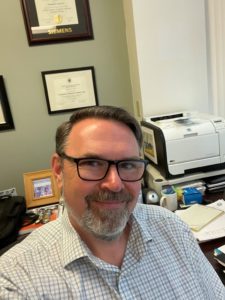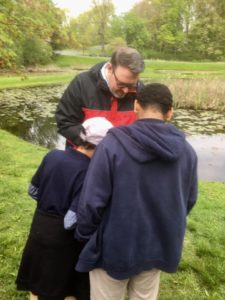Monday, June 20, 2022
For Immediate Release
Springfield Public Schools Scaffolds Educator Professional Learning
for Phenomenal Student Science Learning Outcomes
Springfield, MA – Springfield Public Schools Director of Science Ron St. Amand has been scaffolding professional learning for educators at his district for over ten years. In his role, Ron supports educators with their teaching practice by designing science, technology, and engineering curriculum and assessment. Ron outlines professional learning goals and curriculum needs by following educational trends, conducting classroom observations, and working directly with educators to develop and select curriculum. Ron’s big-picture thinking and long-term strategizing led him to connect with the Wade Institute for Science Education in 2013 to design Customized Professional Learning Services sessions tailored to the needs of educators at Springfield. “We have always had an inquiry focus,” he says, “We have used the 5 E model. But, the Science and Engineering Practices were something new. Professional learning gave teachers a chance to look closely at the Standards.” Ron says that having the Wade Institute Education Specialists as “thought partners” has been “really impactful.”
How does one become Director of Science at a school district and how does Ron support educators in his role? Ron followed his interest in botany through college, gained on-the-job experience, and then pursued a graduate degree in plant biology at UMass Amherst. While in graduate school, Ron discovered his passion for education by working as a teaching assistant. “I really enjoyed that more than working in the lab,” he says. “It quickly became apparent that I wanted to be a teacher.” An environmental education camp assistant role at Mass Audubon reinforced his sentiment and Ron switched his major in order to obtain a teaching license. He taught Advanced Placement environmental science, biology, and chemistry at Springfield High School of Science and Technology and was encouraged by colleagues to transition into a leadership position. As a licensed school administrator, Ron’s work at Springfield Public Schools expanded from Assistant Principal of Springfield High School of Commerce to Science Supervisor and now Director of Science at the district’s Central Office. “I love being able to support teachers and see them excited about stuff,” Ron says. “To see the excitement on kids’ faces when they come up with a new idea or are just interested in phenomena or whatever it is they are studying. Excitement for and engagement with the natural world.”

Ron at Central Office; Photo courtesy of Ron St. Amand
Since there are only two staff dedicated to designing professional learning, curriculum, and assessment at Springfield’s Central Office, Ron invoked the support of the Wade Institute for Science Education to address the needs of the district when working with the then new learning standards. “We needed the manpower – or woman power – to get the job done,” he says. Initial sessions were centered around the Science and Engineering Practices that are part of the Next Generation Science Standards (NGSS), a set of learning standards that was just coming out of its drafting phase and being implemented at schools at that time.
Ron and Wade Institute Education Specialists tailored Customized Professional Learning Services sessions to increase educators’ comfort with using the Science and Engineering Practices, NGSS, and subsequently the 2016 Massachusetts Science and Technology/Engineering Curriculum Frameworks. Ron says that access to resources such as state-issued Strand Maps, large charts of grade-by-grade learning progressions outlined in the Frameworks, helped his educators see the big picture of how teaching changes over time. “We were able to bring those in and show teachers what students would need,” he says. “Learning progressions. What does that look like around the Practices? What does modeling look like in 1st grade, 8th grade, and then in High School?”
A 2019 grant from the Massachusetts Life Sciences Center enabled Ron to continue scaffolding professional learning at his district. “At the time, the Wade Institute had gone through Next Generation Science Exemplar (NGSX) program training and some of the elements were brought to Customized Professional Learning Services with Springfield,” Ron says. He gives the example of “storyline based teaching” and shares how a Springfield high school science teacher and science coach noted that she “has never seen students so engaged as when they were using the storylines curriculum.” Ron and his colleagues have observed that it is the anchoring phenomena that really drive student engagement and prompt their personal science learning journeys. “It’s a great joy to go in a classroom and see teachers using the strategy, storylines, etc.,” says Ron. Since the district started to implement storyline curriculum and strategies, teachers have chosen phenomena-based learning units to try in their classrooms.

Ron visits Springfield’s ECOS program in Forest Park.
Photo courtesy of Ron St. Amand. Image credit: Sharon DaSilva
In 2020, Ron recognized that Springfield educators would not only need to be honing their skills teaching to the new Standards but also teaching remotely. He worked with the Wade Institute to “Zoom in” on strategies for effective remote science instruction. Ron says that the Education Specialists quickly developed professional learning that would address the changing needs of his district. “We really work well together,” he says. “It’s just a good partnership.” Ron adds that the Wade Institute’s work has often coincided with Springfield’s curriculum developments and that the organization’s certification as an OpenSciEd Professional Learning Provider was “awesome because that is the direction we were going. It has linked up very nicely with the work we’ve been doing.” Ron has scheduled more professional learning sessions with the Wade Institute to follow the 2021-2022 school year. This time, the focus will be on building scaffolding and understanding of the OpenSciEd curriculum through the Wade Institute’s OpenSciEd Professional Learning program. Ron feels confident that this will further prepare Springfield educators for implementation of OpenSciEd units in their classrooms, since NGSS is integrated into the OpenSciEd curriculum. Ron describes how the work has scaffolded over time: “OpenSciEd has adopted a lot of the routines of NGSS storylines and we’ve used the anchoring phenomena routine with the Wade Institute. OpenSciEd key instructional elements are driven by student ideas, student voice, student questions (focus on key instructional routines from one storyline to another).” Ron says that use of phenomena-based instruction has been so successful at Springfield that he and the Wade Institute came to call their sessions, “Phenomenal Science Learning.”
About the Wade Institute for Science Education’s Customized Professional Learning Services and OpenSciEd Professional Learning Programs
The Wade Institute for Science Education promotes and enables hands-on, minds-on, inquiry-based science, technology, and engineering education by providing professional learning programs for K-12 and informal educators. Customized Professional Learning Services provide professional learning experiences tailored to teachers’ needs within a school or district. They align with the 2016 MA Science and Technology/Engineering Framework, model the use of the Science and Engineering Practices for instruction and assessment, apply inquiry-based science instruction strategies, and support educators’ skills to develop phenomena-based units and investigations.
OpenSciEd is open-source, K-12 science instructional materials that support the Next Generation Science Standards (NGSS) and the Massachusetts Curriculum Frameworks. Massachusetts is one of 10 partner states that helped to create these high-quality, locally adaptable materials that support equitable science learning. The Wade Institute for Science Education is a certified OpenSciEd Professional Learning Provider. Through the Wade Institute’s OpenSciEd Professional Learning, educators can explore phenomena-based learning and the Anchoring Phenomena Routine, deep dive into individual OpenSciEd units, and receive both science and pedagogical support. The Wade Institute also supports school and district-wide OpenSciEd curriculum launches.
###
The Wade Institute for Science Education specializes in providing inquiry-based, hands-on, minds-on, science, technology and engineering professional development for K-12 teachers and informal educators. For more information, visit www.wadeinstitutema.org or call 617-328-1515.
